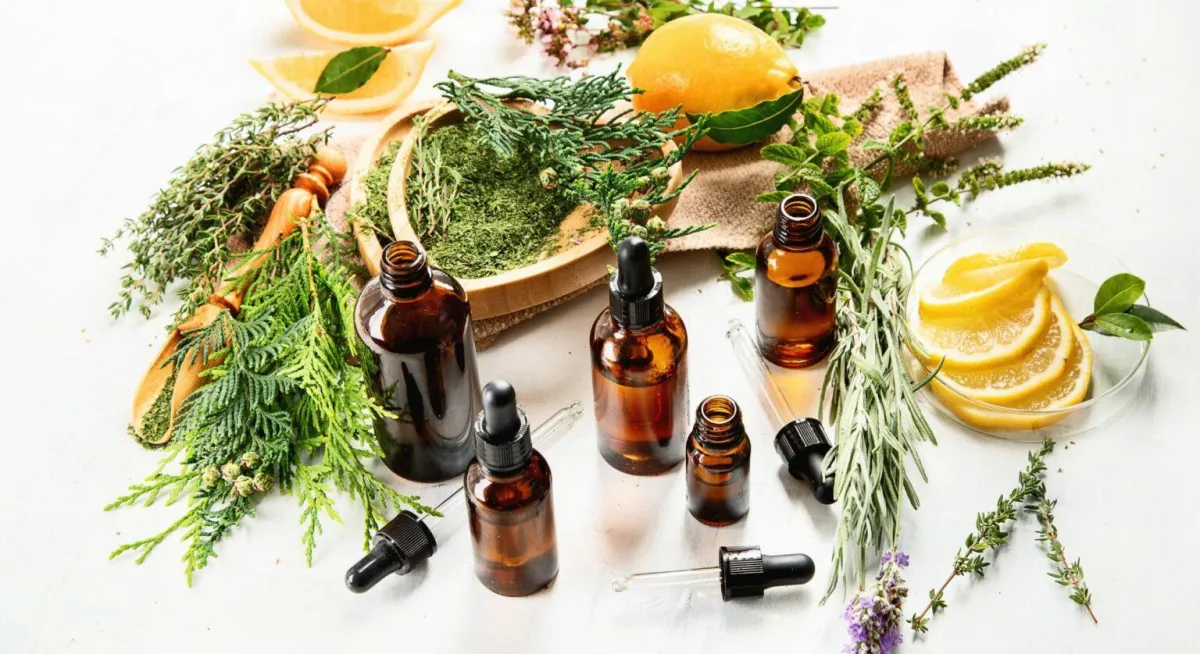
5 Must Have Essential Oils
If you are just staring out using essential oils it can be overwhelming which oils to buy, given the wide variety available. A good approach is to start with a few versatile oils that suit your needs or preferences. We will be discussing five oils—lavender, frankincense, lemon, peppermint, and tea tree all great choices due to their versatility and numerous benefits.
Lavender Essential Oil
Lavender essential oil is one of the most popular and versatile essential oils, prized for its soothing aroma and numerous therapeutic properties. Derived from the lavender plant (Lavandula angustifolia or Lavandula officinalis), this essential oil has been used for centuries for its medicinal and aromatic benefits. Here is a detailed overview of the benefits of lavender essential oil:
Relaxation and Stress Reduction: Lavender essential oil is renowned for its calming and relaxing properties. Inhaling the aroma of lavender oil can help reduce stress, anxiety, and nervous tension. It can promote relaxation and induce a sense of calmness, making it beneficial for managing stress and promoting better sleep quality.
Improved Sleep: Due to its calming effects, lavender oil is often used to promote better sleep. Diffusing lavender oil in the bedroom or adding a few drops to a pillow can help create a peaceful environment conducive to sleep. It can also help alleviate insomnia and improve sleep quality.
Pain Relief: Lavender essential oil possesses analgesic properties, which can help alleviate various types of pain, including headaches, muscle aches, joint pain, and menstrual cramps. Massaging diluted lavender oil onto the affected area can provide relief from discomfort.
Anti-inflammatory Effects: Lavender oil contains compounds that have anti-inflammatory properties, making it beneficial for reducing inflammation and swelling associated with conditions such as arthritis, injuries, and skin irritations.
Skin Care: Lavender oil is often used in skincare products due to its soothing and healing properties. It can help promote healthy skin by reducing redness, inflammation, and irritation. Lavender oil is also known for its antimicrobial properties, which can help prevent acne and other skin infections.
Wound Healing: The antimicrobial and anti-inflammatory properties of lavender oil make it effective in promoting wound healing. Applying diluted lavender oil to minor cuts, scrapes, and burns can help cleanse the wound, reduce the risk of infection, and accelerate the healing process.
Respiratory Benefits: Inhalation of lavender oil vapors can provide respiratory benefits, helping to relieve symptoms of respiratory conditions such as colds, flu, coughs, and congestion. The soothing aroma of lavender oil can help clear the airways and ease breathing.
Mood Enhancement: Lavender oil has mood-enhancing properties and is often used in aromatherapy to uplift the spirits and promote a sense of well-being. Its pleasant aroma can help alleviate feelings of depression, anxiety, and mood swings.
Improved Cognitive Function: Some research suggests that the aroma of lavender oil may have cognitive-enhancing effects, such as improving concentration, memory, and mental clarity. Diffusing lavender oil in the workspace or studying environment may help enhance cognitive function.
Insect Repellent: Lavender oil has natural insect-repellent properties, making it useful for keeping mosquitoes, flies, moths, and other insects at bay. Diluted lavender oil can be applied to the skin or added to natural insect repellent formulations.
Peppermint Essential Oil
Peppermint essential oil has a fresh, minty, and invigorating scent. It’s often described as crisp, cool, and slightly sweet. The aroma is primarily due to the presence of menthol, which gives peppermint its characteristic cooling sensation. Overall, the scent of peppermint is widely appreciated for its ability to uplift, refresh, and invigorate, making it a popular choice in aromatherapy and personal care products. Here are some of the benefits of peppermint:
Relieves Headaches: The cooling effect of peppermint oil can help alleviate headaches. Applying diluted oil to the temples and forehead may provide relief.
Boosts Energy and Mental Clarity: Inhaling peppermint oil can help increase alertness and improve focus, making it a great option for studying or work.
Relieves Muscle Pain: The analgesic properties of peppermint oil can help reduce muscle soreness and pain. Diluting it with a carrier oil and massaging it into sore muscles may provide relief.
Clears Respiratory Tract: Peppermint oil’s menthol content can help clear the respiratory tract, making it beneficial for easing congestion and improving breathing.
Natural Insect Repellent: Peppermint oil is often used as a natural insect repellent, particularly against mosquitoes.
Antimicrobial Properties: Peppermint oil has antimicrobial properties that may help fight off certain strains of bacteria and fungi.
Frankincense Essential Oil
Frankincense essential oil has a long and storied history, dating back over 5,000 years. It has been revered in the Middle East, North Africa, and India for its religious, medicinal, and cultural significance. The oil was highly prized in ancient times, often considered as valuable as gold. It played a prominent role in religious ceremonies and rituals and was even mentioned in the Bible as one of the gifts offered to the infant Jesus by the three wise men.
Frankincense has a complex and rich aroma. It is often described as woody, earthy, and slightly sweet, with hints of spice and fruit. The scent can vary depending on the species of frankincense and the region where it is sourced. Generally, the aroma is warm, resinous, and balsamic, with a subtle citrusy undertone. It also has some amazing benefits:
Anti-inflammatory: Frankincense oil contains compounds that may help reduce inflammation, making it beneficial for conditions such as arthritis and inflammatory bowel disease.
Pain Relief: Due to its anti-inflammatory properties, frankincense oil may also help alleviate pain, particularly joint and muscle pain.
Stress Relief: The aroma of frankincense oil is known to have a calming effect on the mind and body, helping to reduce stress and anxiety.
Immune Support: Frankincense oil has been shown to have immune-boosting properties, which may help the body fight off infections and illnesses.
Skin Health: Frankincense oil is often used in skincare products for its ability to promote healthy skin. It may help reduce the appearance of scars, blemishes, and wrinkles.
Mood Enhancement: The aroma of frankincense oil is uplifting and may help improve mood and promote a sense of well-being.
Lemon Essential Oil
Lemon essential oil is a bright, happy uplifting scent. It is derived from the rind of the lemon and can be both steam distilled or cold pressed. Cold pressed lemon essential oil is phototoxic and must be used with care when appled to the skin. Phototoxicity is a reaction that occurs when certain essential oils, particularly citrus oils like lemon, lime, and bergamot, are applied to the skin and then exposed to sunlight or UV rays. This can cause skin irritation, redness, or burning.
Used properly lemon essential oil has an array of benefits:
Uplifting and Energizing: The bright, citrusy aroma of lemon oil is invigorating and can help uplift mood and increase energy levels.
Antimicrobial Properties: Lemon oil has antimicrobial properties that may help kill bacteria and viruses, making it a popular choice for natural cleaning products and as a disinfectant.
Improves Cognitive Function: The scent of lemon oil has been shown to improve cognitive function, including memory, concentration, and alertness.
Supports Digestion: Lemon oil may help support healthy digestion by stimulating the production of digestive juices and enzymes.
Skin Care: Lemon oil is often used in skincare products for its astringent and antiseptic properties. It may help reduce acne, brighten skin, and reduce the appearance of scars and age spots.
Immune Support: Lemon oil is rich in antioxidants, which can help support the immune system and protect the body against oxidative stress.
Respiratory Health: Inhaling the vapor of lemon oil may help relieve respiratory issues such as coughs, congestion, and sore throat.
Natural Deodorizer: Lemon oil has a fresh, clean scent that can help neutralize odors, making it a popular choice for air fresheners and cleaning products.
Tea Tree Essential Oil
Tea tree essential oil is derived from the leaves of the tea tree plant (Melaleuca alternifolia), which is native to Australia. The oil is extracted through a process called steam distillation. Tea Tree has a unique scent that is often described as fresh, medicinal, and herbaceous. It has a sharp, camphoraceous aroma with notes of pine and eucalyptus. Some people also perceive a slightly sweet or nutty undertone in the scent.
The aroma of tea tree oil is powerful and invigorating, with a strong herbal character that sets it apart from other essential oils. Tea tree essential oil offers a wide variety of benefits:
Antimicrobial Properties: Tea tree oil is well-known for its powerful antimicrobial properties, which can help fight bacteria, viruses, and fungi. It is often used to treat acne, fungal infections (such as athlete’s foot and nail fungus), and various skin conditions.
Anti-inflammatory Effects: Tea tree oil has anti-inflammatory properties that can help reduce redness, swelling, and inflammation. It may be beneficial for soothing skin irritations and insect bites.
Acne Treatment: Due to its antimicrobial and anti-inflammatory properties, tea tree oil is a popular natural remedy for acne. It can help reduce the severity of acne lesions and prevent new ones from forming.
Skin Care: Tea tree oil is used in many skincare products due to its ability to cleanse and purify the skin. It can help unclog pores, remove excess oil, and reduce the appearance of blemishes.
Hair Care: Tea tree oil is often used in hair care products for its cleansing and purifying properties. It can help remove build-up from the scalp, reduce dandruff, and promote healthy hair growth.
Natural Deodorizer: The fresh, clean scent of tea tree oil makes it a popular choice for deodorizing and freshening the air.
Household Cleaning: Tea tree oil is a natural disinfectant and can be used to clean and sanitize surfaces around the home.
Insect Repellent: The strong scent of tea tree oil can help repel insects, making it a useful natural insect repellent.
It’s important to note that while tea tree oil has many potential benefits, it can cause skin irritation in some individuals, especially those with sensitive skin. It should be used with caution and in moderation. If you experience any adverse reactions, discontinue use and consult a healthcare professional.
Conclusion
All of the above oils are great choices for you to start your collection of essential oils. You might also consider your specific needs or goals. For example, if you’re looking to improve sleep, lavender might be a good choice. If you’re interested in boosting your mood or energy, lemon or peppermint could be beneficial.
It’s also helpful to consider the aroma of the oils, as you’ll likely enjoy using oils that you find appealing. Sampling different oils or starting with smaller bottles can also be a good idea until you find the ones you like best.
It is also very important to follow safety guidelines when using essential oils. Always dilute all essential oil with a carrier oil before applying it to the skin and perform a patch test to check for sensitivity. Avoid using near the eyes, and consult with a healthcare professional before using internally, especially for children, pregnant women, or those with medical conditions.

Free Mindfulness Journal
© 2024 Seeker of Beauty built by
sweetsallysscents


Facebook
Instagram